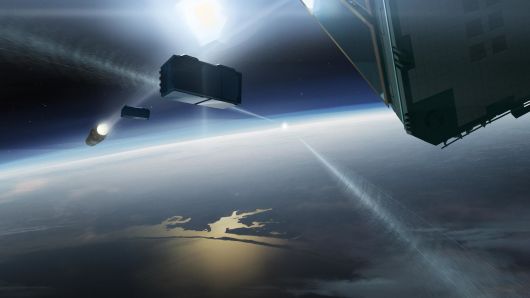
In the loud and crowded world of satellites, start-up LeoLabs is working toward offering both governments and companies alike a solution to cut through the noise.
Tens of thousands of objects fly around the Earth many times faster than a bullet, capable of destroying billions of dollars in equipment. LeoLabs wants to offer an infrastructure of equipment and software to enhance the eyes on the sky with a new source of risk-assessment data.
“Ninety-five percent of the risk of being hit by a piece of debris is not being tracked,” CEO Dan Ceperley told CNBC.
LeoLabs’ most recent round of funding raised $13 million, with Airbus Ventures and WERU Investment leading the round, joined by Space Angels and Horizons Ventures. The cash means LeoLabs will begin building next-generation ground systems overseas, adding to the two it has in Midland, Texas and Fairbanks, Alaska. “Starting next year,” Ceperley said, these phased-array radar ground systems “will be providing the information that makes tracking that debris possible.”
“You’re looking at the first company trying to accomplish a Google Maps around the Earth,” Airbus Ventures partner Julien Etaix told CNBC.
LeoLabs estimates there are about 250,000 pieces of debris orbiting the Earth that are both not tracked and potentially disastrous if they collide with a satellite. The U.S. military is tracking about 23,000 objects in space around the Earth, according to AGI, a company which provides software to commercial and government entities to analyze and track objects. AGI estimates the current public catalogs only account for about 4 percent of the objects in space around the Earth.
“It’s our mission to be a global platform,” says LeoLabs vice president of business development Alan DeClerck. “The real currency of what we’re able to do with the radar is frequency of observations.”
LeoLabs sees three potential customer groups in the space industry: Satellite companies (which, shortly after a launch, want to know where a satellite is and whether it is healthy), public agencies (especially on the licensing and regulatory side of the public sector which are trying to avoid increase risk to assets in space) and insurers (which underwrite launches and satellite operations in space).
“We specifically got into the business now because now is when the wave of developments are happening,” Ceperley said. “15,000 new satellites are being slated to go into low Earth orbit over the next three to five years.”
With thousands of satellites set to launch, LeoLabs sees the insurance business as a potential boon – especially given the existing risks.
“If you have a big data set then we use that as an example of what developing future applications for space is going to look like,” DeClerck said. “They can write applications that will be worth millions and millions of dollars to the insurance industry.”
Airbus Ventures had contributed to the $4 million LeoLabs raised in the last two years but in this latest round stepped up as co-lead with WERU, a Japanese firm. Etaix explained that Airbus Ventures is not structured “like other aerospace VC funds,” saying that the firm “is quite independent from Airbus.”
“We can connect with Airbus but we don’t really force the marriage with Airbus,” Etaix said.
Etaix added that LeoLabs is already working with the broader Airbus, due to the “number of businesses” that could benefit from this technology, he said.
“Primarily OneWeb, because OneWeb is a project Airbus is heavily involved with because they need the data,” Etaix said. OneWeb is one of several companies building a next-generation constellation of hundreds of satellites for high speed internet.
With 15 employees—LeoLabs expects to add 10 more shortly—that headcount is expanding as the company builds more ground sites and adds capability. Ceperley said it will be “six months from breaking ground to delivering data” with the next location and expects LeoLabs to be able to build additional locations just as quickly. Investment in the space industry has introduced new trends which LeoLabs is attempting to capitalize on: New rockets, lighter and cheaper satellites and a new need to quickly get data from spacecraft in orbit.
“LeoLabs has uniquely harnessed the energy of these trends … and is thereby dismantling some of the last remaining barriers for new space entrants, while making massive constellations for the experienced incumbents newly manageable at an unprecedented level of detailed awareness and reactive capability,” Etaix added.

